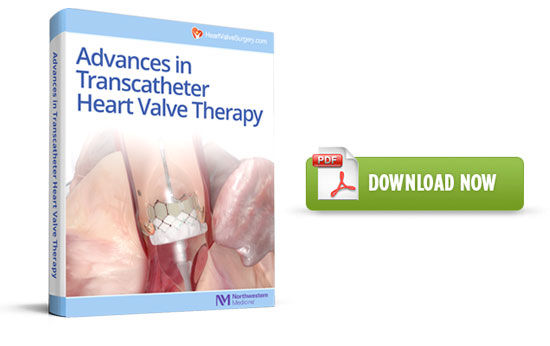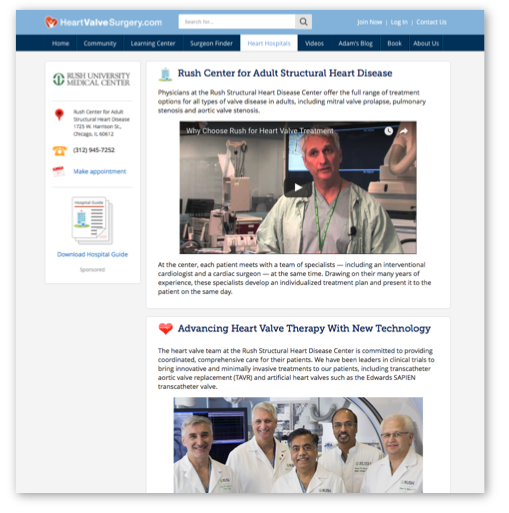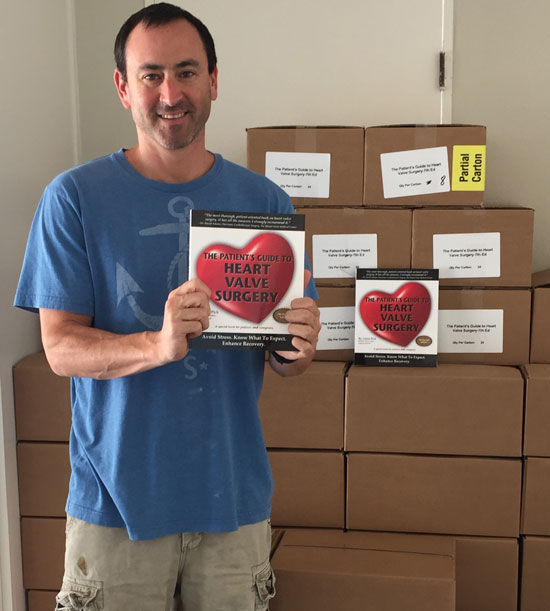Adam's Heart Valve Surgery Blog – Page 24
12 Great Questions To Ask Your Heart Surgeon
By Adam Pick on December 18, 2016
A brilliant question I often receive from patients is, “What should I ask my surgeon when I meet with them?”
I’ve written about this question in the past. However, I thought it would be great to hear how a surgeon might respond to this question. So… At the recent Heart Valve Summit, I asked Dr. Kevin Accola this question. By the way, if you are unfamiliar with Dr. Accola, he is one of the most celebrated surgeons in our community. Doctor Accola has successfully treated many patients from this website including Denise Ring, Scott Neiman, and Tammy Pilcher.
Here are the highlights from my interview with Dr. Accola.
I really hope that hearing Dr. Accola’s ideas and tips will help you or your loved one prepare for heart valve surgery!!!
On behalf of our community, I want to thank Dr. Accola and the AdventHealth (formerly Florida Hospital) team for their incredible support of our patients and our community! Thank you Dr. Accola! Thanks Beverly Masker! Thanks Christy Mize! And, thanks Jenna Tomaselli!
- See Dr. Accola’s Interactive Surgeon Profile
- Discover the AdventHealth (formerly Florida Hospital) Heart Valve Microsite
Keep on tickin!
Adam
P.S. For the hearing impaired members of our community, I have provided a written transcript below.
Adam Pick: Hi, everybody. It’s Adam with HeartValveSurgery.com. Today, we’re at the heart valve summit in Chicago, Illinois. I am honored and thrilled to be here with Dr. Kevin Accola, who’s a cardiac surgeon at AdventHealth in Orlando, Florida. Many of you know this man. He’s helped many patients in our community, with incredibly successful outcomes, including patients like Denise Ring. Dr. Accola, thanks for being here with me.
Dr. Kevin Accola: Adam, it’s great to be here, as always. Thank you. It’s good to see you. I can’t tell you how much this means to our patients. What you’re doing, it’s just incredible. From a grassroots stand point, they can talk and interact online and chat groups and different things with patients that really can empathize with them. Thank you for all you’re doing because it’s just been incredible.
Adam Pick: Thank you. Now, let’s get to a question that we get from a lot of the patients. I get emails, I get texts, I get phone calls. Adam, I’m going in for surgery. I need to meet with a surgeon and I don’t know what questions I should ask them. Being that you’re a surgeon, what is it that patients should ask their surgeons when they go in for that consult?
Dr. Kevin Accola: I think that’s a great question because it’s not like taking a car and you get it fixed, or an oil change. You just take it in good faith that it’s going to get fixed and they’re going to do the right thing. The surgeons are going to do the right thing, but I think to put patients minds at ease, it’s very important for them to not only ask questions, but as, like, with through your book and through your website, they can actually interact with patients who’ve had the surgery; which may inspire them, if you will, to ask the appropriate questions to where they feel comfortable.
I don’t think there’s any one or two questions that have to be asked, so much as, I think the patient needs to want, understand what they’re going to have done, as well as why they’re having it done. What is the pathologic process? Is it a stenotic valve that doesn’t open or close normally? Is it an insufficient valve that leaks because it’s torn? Once they understand it, I think then they can comprehend some of their treatment options. If they don’t understand why they’re there, it’s going to be tough to: one, ask questions, but two, understand what their treatment options are.
I think one of the most important things is to ask, what are their options? Whether it’s surgery, whether it’s continued medical therapy, whether it’s they’re not quite ready to have their surgery done or not is very important, whether they’re emergent or can be more elective because if they have things with work or their children or with other personal circumstances that they need to resolve, then I think that’s important. Do I have to have it done right away?
The other option, of course, is do I need to have – if it’s particularly a mitral valve, can it be repaired or can it be replaced? Do you do valve repairing? What are the various approaches? A lot of the aortic valve surgery can now be done with smaller or limited access incisions. Is that appropriate for me as a patient? If not, then why is that, so that I can understand? Not that it’s right or wrong, but so they can understand.
The best thing that you can do is have it when the patient comes into the hospital that day, is to be comfortable and to be at ease and at peace with what they’re having to do. It is a huge thing, it’s very scary for patients. I think that a lot of these concerns can be alleviated with, again, asking the right questions, as you’ve said. There’s not a definitive question or something that everyone has to answer because it’s very individualized. I think that, again, just asking questions, writing them down, coming to the office or in the hospital with these questions I think is the key point.
Adam Pick: You mentioned a couple great things. You mentioned writing down your questions before you come in to see the surgeon because it can be uncomfortable when you’re talking to somebody in a white lab coat, and their talking about opening up your heart, perhaps. Have you ever had anybody tape record the sessions so that they don’t forget what was communicated during their consult?
Dr. Kevin Accola: Yeah, I have. A lot of times, that’s more important if they have family members that aren’t there or can’t be there. We either, we’ll do a telephone conference or FaceTime with them, or whatever they feel comfortable with is fine with me. If they want to tape record the question answer session, I think that’s fine as well. A lot of times they’ll get home and they will forget what they even asked, and what was the answer. It’s a lot going through their mind, and often times patients – because of the capabilities of the internet, which is good because patients do look into other options and have a better understanding, but it’s sometimes bad because the patients are super saturated with all this information. Often times they come in with this preconceived idea this is what they’re going to get, which it might not even correspond to, really, the treatment options. It is good to look on the internet, but I tell patients don’t overdo it because there is some marketing, there’s some other vested interests, there’s also – because often times they’ll get super saturated with information.
Adam Pick: Final point I’ll bring up, Dr. Accola, is this concept of being uncomfortable when you leave a doctor’s visit. Maybe you’re uncomfortable with what you hear or maybe you’re uncomfortable with the clinician. Do you every recommend or would you advise patients that if they’re not comfortable, maybe they get a second opinion?
Dr. Kevin Accola: Absolutely, Adam. Again, they’ve got to be comfortable with what they’re getting into. If there’s ever any doubt, I always encourage a second opinion. In addition to that, if they’re uncertain, they always spend time with my assistant as well as my administrative assistant, so that they have opportunity to come back and say, wait a minute, can I ask him a couple more questions? Also, I always tell them, look, if you want to come back and sit down again, you want to bring your daughter or son from out of town, or your spouse isn’t with you, come back and let’s do this again.
Again, it’s so important to me, particularly. Often times these are elective surgical procedures, which there are other options or they may want to find some other type of opinion, which I think is good because at the end of the day, I want someone when they do come to the hospital and they are ready for their heart surgery, again, to be at ease and at peace with what they’re going to do and feel comfortable. There’s no questions patients do better when they bought in, if you will, emotionally, and approach this enthusiastically; not only with the surgical procedure, but then in the convalescence period, they’re not going, my goodness, why did I do this? I think that it improves not only the way they enter surgery, but also the way they convalesce through the surgery.
Adam Pick: Dr. Accola, thank you for the great responses, the coaching you just provided all of our patient community. I just want to thank you for everything you’re doing at AdventHealth in Orlando. Thanks so much for being here.
Dr. Kevin Accola: It’s my privilege. We got a great team. Again, it’s just we’re proud to be a part of what you’ve done here and developed because it’s just incredible.
Adam Pick: Thank you so much! As we always say here, keep on tickin’!
At the Marathon Finish Line, Phil Held This Up!
By Adam Pick on December 9, 2016
A BIG question patients ask me prior to heart valve surgery is, “Will I be able to do the things I love after surgery?”
Well… Let’s consider the story of Phil McBride. At 62, Phil was an avid runner and an active member of Eastside Running Club. His love of competition kept him running at higher and higher levels. In November 2015, about 1 mile into a race leading up to the USA Track and Field National Cross Country Championships, Phil began having a hard time catching his breath. He was able to finish the race but in his words he “had an awful run”.
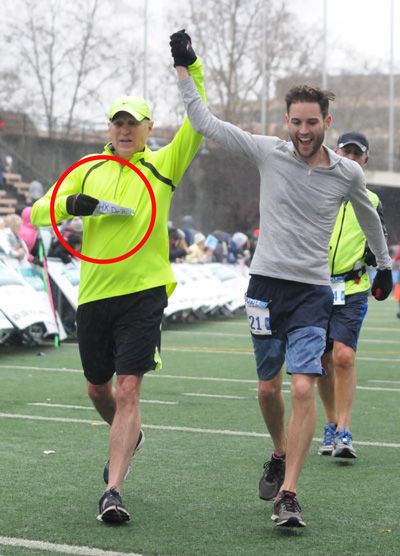
Technology Update: What Should Patients Know About Transcatheter Mitral Valve Therapy?
By Adam Pick on December 9, 2016
I get a lot of great questions and phone calls about transcatheter mitral valve therapy. So, at the recent Heart Valve Summit, I sat down with Dr. Steven Bolling to help all of us learn the latest updates about transcatheter mitral valve repair and replacement technologies.
Why Dr. Bolling? Well… Dr. Steve Bolling is the Director of the Mitral Valve Center at the University of Michigan. During his career, Dr. Bolling has performed over 5,000 heart valve procedures. You should also know that Dr. Bolling has been a huge supporter of our community and Dr. Bolling has successfully treated bunches of patients from our community including Jeff Adams, George Parrish and Linda Comai. Here’s the highlights from my interview with Dr. Bolling:
This 91-Year Old Patient & Dr. Mack Did What???
By Adam Pick on November 22, 2016
One thing I love about being a part of this community is seeing and hearing wonderful patient stories. I often tell Robyn, my wife, I’m constantly “TMI’d” by this community. (So you know, the acronym TMI, in our family, means touched, moved and inspired. 🙂 )
Well… I was just TMI’d again thanks to Tony Taddeo, a 91-year old heart valve patient, and Dr. Michael Mack, his cardiac surgeon. If you are ready for a little TMI, please watch Tony’s video below:
Many thanks to Tony Taddeo for being such an inspiration to our community!!! Also, we would like to thank Dr. Michael Mack and his awesome team at The Heart Hospital Baylor Plano for their excellent care of Tony!!!
Keep on tickin’ Tony!
Adam
Free eBook: What are the Latest Advances in Transcatheter Heart Valve Therapy?
By Adam Pick on November 16, 2016
Great news! Our webinar, “Advances in Transcatheter Heart Valve Surgery”, was amazing! During this online event, over 150 patients connected live with Dr. McCarthy, Dr. Davidson, Dr. Malaisrie and me.
If you missed the webinar, you can now download the free eBook by clicking here.
Watch the Webinar Live!
In addition to the eBook, you can also watch the webinar that was filmed live.
On behalf our community, many, many, many thanks to Dr. Patrick McCarthy, Dr. Charles Davidson, Dr. Chris Malaisrie, Jane Kruse, Barbara Garren and the entire Northwestern Medicine team for coming together for this wonderful community event.
Keep on tickin!
Adam
CDC Update: What Should You Know About Heater Cooler Machines, Infections & Heart Surgery?
By Adam Pick on November 8, 2016
In case you missed it… There was a very important CDC update recently that addressed a potential link between heater cooler machines and infections for heart surgery patients. My goal with this post is not to alarm you. Instead, with the help of Dr. Raymond Singer and the CDC, I want to educate you about this development.
That said, I filmed this video with Dr. Singer to discuss several key points that patients should know about heater cooler units and a potential infection that results from nontuberculous mycobacteria. For more, watch this video…
In addition to the Dr. Singer’s comments, I also wanted to share this video that was posted by the CDC about heater cooler machines and the potential bacteria that may infect heart valves.
What Does Your Aortic Valve Look Like in 3D?
By Adam Pick on October 24, 2016
I’m just getting back from the Heart Valve Summit in Chicago. It’s an amazing conference where hundreds of surgeons, cardiologists, nurses and medical device companies gather to discuss the best practices for heart valve management and therapy.
While there, I was very lucky to see how 3D echocardiograms are helping doctors before, during and after surgery. As you will hear from Christine Wagner, a product application specialist with Philips Ultrasound, these images were taken using a transesophageal echocardiogram, also known as a 3D-TEE.
Thanks so much to Christine and Philips for all the great work they are doing to help the surgeons help us patients!!!
Keep on tickin!
Adam
P.S. For the hearing impaired members of our community, here is a written transcript of the video with Christine Wagner.
Christine: Hi, I’m Christine Wagner, a product application specialist for Phillips Ultrasound. I want to describe what you’re seeing on the screen here. This is a 3D TEE, and it is an en face view of the aortic valve. You can see all three cusps here. You’ll see this little black line there, which is a coronary artery. By using this technology, we are able to see not only exquisite detail, but I can rotate this image around. I can see it from the front and the back. It allows us to give such detailed information to our surgeons that they were really never able to have before, both pre and during an aortic valve procedure.
Interviewer: Wow. Thanks so much, Christine.
Christine: You’re welcome.
Interviewer: We really appreciate it.
Surgeon Q&A: Can an Aortic Valve Replacement Fit in the Mitral Position?
By Adam Pick on October 17, 2016
I just received a great question from Dorothy about heart valve replacements. Dorothy asked me, “Hi Adam, Why can some of the newer valves, like the Perceval and Trifecta GT, only be used in the aortic position and not the mitral? If those valves are new and good shouldn’t they be used in the mitral position as well? I have moderate mitral stenosis. Thanks Adam!”
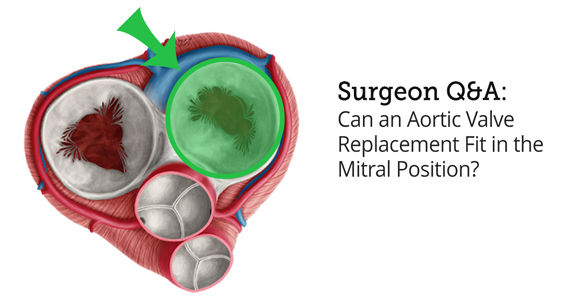
Happy World Heart Day! Join Me Now At Facebook!
By Adam Pick on September 29, 2016
Happy World Heart Day!!!!
If you didn’t know, this wonderful campaign was started by the World Heart Federation to raise global awareness for cardiovascular disease. To support this effort, HeartValveSurgery.com just launched an interactive, all-day campaign to elevate awareness to heart valve disease. To join me, please visit and like our Facebook page.
Thanks to the World Heart Federation and our wonderful community for being a part of World Heart Day! I hope to see you over at Facebook!
Keep on tickin!
Adam
Rush University Medical Center Launches Heart Valve Microsite!
By Adam Pick on September 29, 2016
I am very excited to announce that Rush University Medical Center (Rush) just launched a Heart Valve Microsite at HeartValveSurgery.com!
Rush, which is located in Chicago, is taking a unique approach to heart disease. The Rush Center for Adult Structural Heart Disease, was developed to offer patients a wide range of treatment options for all types of valve disease in adults. Using a heart team approach, each patient meets with a team of specialists to determine the best treatment for diseases including aortic stenosis, mitral valve prolapse and pulmonary stenosis. See the new Rush Valve Microsite.
Surgeon Q&A: What Are 8 Important Facts About Calcified Heart Valves?
By Adam Pick on September 15, 2016
I’ll never forget when my cardiologist said to me, “Adam, The calcium on your valve is causing serious problems. Your valve is stenotic. You need a new valve.” In that moment, I was overwhelmed with emotions and… questions. Some of the questions were, “What do you mean calcium on the valve?” and “What is stenosis?” and “OMG! Do I really need heart surgery?”
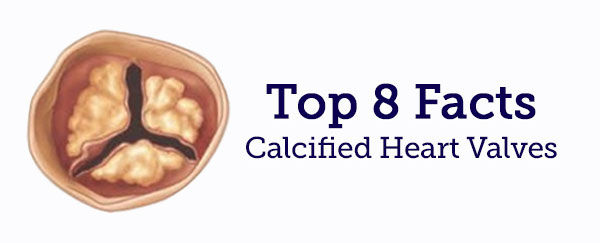
Ten years after surgery, I’m thrilled to report that my aortic valve replacement is doing great. That said, I receive a lot of excellent questions from our community about heart valve calcification. So, I wanted to create a special post dedicated to this very important topic.
What Happened When 100 Patients & Caregivers Met for “Patient Day 2016” at Edwards Lifesciences?
By Adam Pick on August 25, 2016
Something special recently happened. More than 100 patients and their care partners traveled to Edwards Lifesciences, a leading heart valve manufacturer in Irvine, California, to meet each other, to share their stories and to inspire action within our community – the heart valve patient community.
This day is appropriately called… Patient Day!!!!!
Luckily, Edwards asked us to attend Patient Day 2016 and film the wonderful moments of this unique event that included meet-and-greets with the heart valve assembly teams, panel and group discussions, a heart valve museum tour and more. My favorite part of the day was watching patients meet the Edwards employees who made their valves by hand.
Ready to see what happened at Patient Day? Watch the video below…
Thanks to the patients and caregivers who traveled – from near and far – to participate in Patient Day. And… On behalf of our community, I want to extend a mighty thanks to the entire Edwards team for empowering the patient voice at “Patient Day 2016.”
Surgeon Q&A: What’s The Difference Between Primary & Secondary Mitral Regurgitation?
By Adam Pick on August 17, 2016
At the recent American Association for Thoracic Surgery meeting in Baltimore, I was very lucky to connect with Dr. Vinay Badhwar, the executive chair of the West Virginia University Heart & Vascular Institute. During our chat, we had a very interesting conversation about the differences between primary and secondary mitral regurgitation.
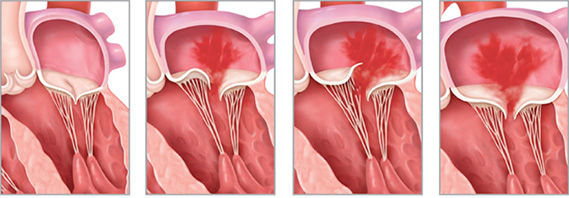
I wanted to learn more. So, after I got home from Baltimore, I emailed Dr. Badhwar to see if he would help me put together a “Surgeon Q&A” about this very important topic. Guess what? As you will see below, Dr. Badhwar agreed! 🙂
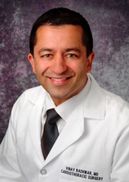 Dr. Vinay Badhwar – Heart Surgeon
Dr. Vinay Badhwar – Heart Surgeon
1. What is mitral regurgitation? What are the common symptoms?
Dr. Badhwar Says: Mitral regurgitation or “MR” is a backward leakage of the central valve of the heart, the mitral valve. The mitral valve is a one-way valve that works like a set of two French doors that meet in the middle. It is made up of the doors (known as leaflets) and the door frame (known as the annulus). When a problem occurs with either the door (leaflet) or the door frame (annulus), the valve can leak. When MR occurs, blood leaks from the left ventricle, backward across the mitral valve, into the left atrium, then backwards into the lungs.
Technology Update: Exceptional Hemodynamics & More Earn Trifecta GT FDA Approval; 7 Facts You Should Know
By Adam Pick on August 9, 2016
In case you missed it… The Trifecta Valve with Glide Technology (Trifecta GT) just received a U.S. Food & Drug Administration approval. This is really great news for patients given the unique advantages of this aortic valve replacement.
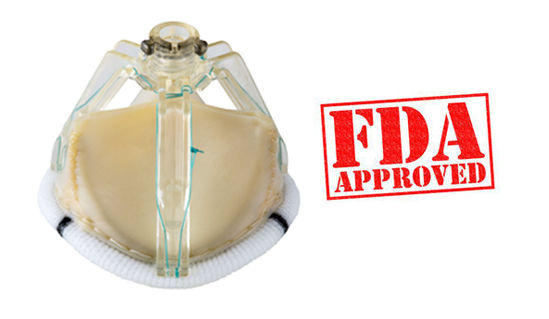
To learn more, I contacted Dr. Douglas Johnston. So you know, about 70% of Dr. Johnston’s cases includes valve therapy and Dr. Johnston has already implanted many Trifecta GT valves. In addition, Dr. Johnston has successfully treated several patients in our community including Sonny Abassi and Sandra Shaw. 🙂
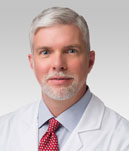
WVU Medicine Launches Heart Valve Microsite!
By Adam Pick on July 21, 2016
I am very excited to announce that WVU Medicine just launched a Heart Valve Microsite at HeartValveSurgery.com!
WVU Medicine, which is located in Morgantown, West Virginia, is really taking on heart disease. WVU Medicine just recruited world renown heart valve specialist, Dr. Vinay Badhwar, to lead the cardiac center. And… The WVU Heart and Vascular Institute will be headquartered in a new $200 million, 10-story tower on WVU Medicine’s main campus which is scheduled to open in January 2017. The WVU Heart and Vascular Institute will additionally be home to WVU Medicine’s statewide efforts in cardiovascular quality and research, clinical education, outreach, and statewide program development. See the new WVU Valve Microsite.
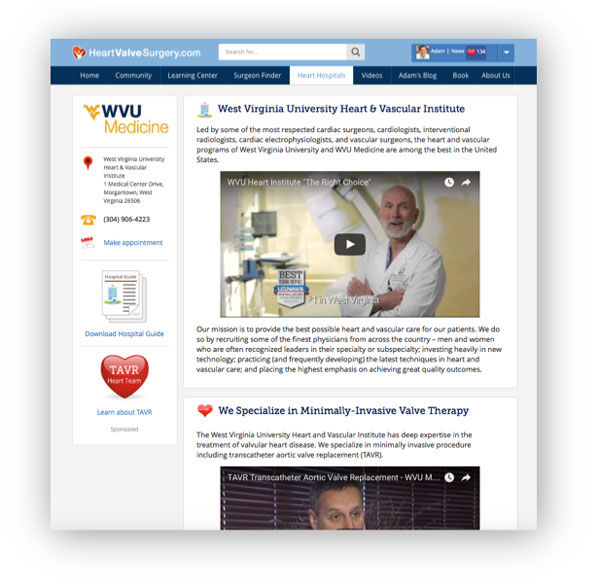
So Sorry! Please Accept An Instant 35% Discount On My Book!
By Adam Pick on July 21, 2016
I am so sorry that we ran out of paperback copies of my book, The Patient’s Guide To Heart Valve Surgery, last month. I know many of you were disappointed by the sell-out.
I want to try and make it up to you. So, for the next 7 days, we are going to offer everybody a 35% discount on both the paperback and eBook copies my book. Fyi, this is the first time since publishing the book in 2006 that we have discounted the price.
Again, I’m so very sorry about this.
Keep on tickin!
Adam
Surgeon Q&A: What Are My Heart Valve Replacement Options? (Plus, 3 Patient Stories)
By Adam Pick on June 30, 2016
A common question I receive from patients who can not have their valves repaired is, “What are my valve heart replacement options?”
For this reason… I jumped at the chance to film an educational video about this topic with Dr. Alfredo Trento, the Director of Cardio-Thoracic Surgery at Cedars-Sinai Medical Center. So you know, Dr. Trento is a valve guru having successfully performed over 4,000 heart valve operations and treated many patients from our community including Robin Hirsch, Jerry Andis and Angie Brooks. 🙂
Here are the highlights from my discussion with Dr. Trento…
As many patients, including me, will tell you… The process of selecting a heart valve replacement can be challenging. I always encourage patients and their family members to create a “Pros and Cons” list for each valve given the patient’s lifestyle, age and activity level. As one doctor confided in me, “At this time, there really is not a perfect valve replacement for all patients types. There are, however, many options that have been developed to fit each patient population.”
Patient Success Story Videos with Mechanical, Tissue & TAVR Valves
For this reason, I these and other reasons, I thought you might like to see patient success stories I filmed with patients that selected different types of valve including a mechanical valve, a tissue valve and a TAVR.
Surgeon Q&A: “Is Heart Valve Disease Genetic?” asks Sue
By Adam Pick on June 20, 2016
A great question from Sue came in regarding genetics and heart valve disease. She asked me, “Adam – Is heart valve disease genetic or is there a tendency to develop valvular disease in the later years of life?”
To answer Sue’s question, I was very lucky to interview Dr. Patrick McCarthy, the chief of cardiac surgery and executive director of the Bluhm Cardiovascular Institute at Northwestern Medicine. If you didn’t know, Dr. McCarthy is a valve specialist having performed over 4,000 heart valve procedures. At our community, Dr. McCarthy has successfully treated many patients as you can see by the 60 patient testimonials posted here.
I hope that helped Sue (and perhaps you) learn more about the genetics associated with heart valve disease. Many thanks to Sue for her question and a special thanks to Dr. Patrick McCarthy for sharing his clinical experiences and research with our community.
Surgeon Q&A: “Can TAVR Be Used for a Bicuspid Aortic Valve & Aneurysm?” asks Valerie
By Adam Pick on May 30, 2016
Valerie sent me a GREAT question about transcatheter aortic valve replacements (TAVR), bicuspid aortic valves and aortic aneurysms. Valerie asked, “Hi Adam – I have a bicuspid aortic valve and aneurysm. Is there any work being done using the TAVR method to also fix an aneurysm too? Or, does an aneurysm negate use of TAVR for valve surgery?”
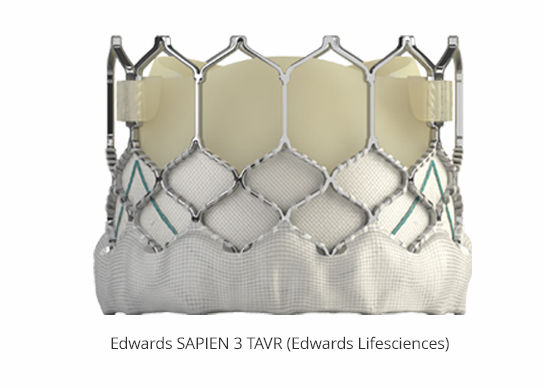
To educate Valerie (and our entire community) about this very important topic, I contacted Dr. Michael Mack. So you know, Dr. Mack is Chairman of The Heart Hospital Baylor Plano, the Medical Director of Cardiovascular Surgery at the Baylor Health Care System and a former President of the Society of Thoracic Surgeons. Specific to TAVR, Dr. Mack was very involved in the PARTNER clinical trials which led to the first FDA approval of the Edwards SAPIEN valve in 2011.
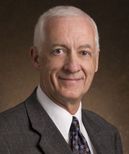
Needless to say, Dr. Mack is a valve and TAVR guru. He’s also a super nice guy who has helped many patients from our community. 🙂
Leilani is a Heart Warrior Princess!
By Adam Pick on May 24, 2016
How would you react if you learned that your unborn child was suffering from a life-threatening disease known as hypoplastic left heart syndrome? What would you do? Who would you turn to?
This is the story of Leilani, Kayla and Jesse…
Many, many, many thanks to Leilani, Kayla and Jesse for sharing their courageous and inspirational story with us. And, an extraordinary thanks goes out to Dr. Evan Zahn and all the team members at the Guerin Family Congenital Heart Program at Cedars-Sinai Medical Center in Los Angeles.
Keep on tickin’ Leilani!
Adam
